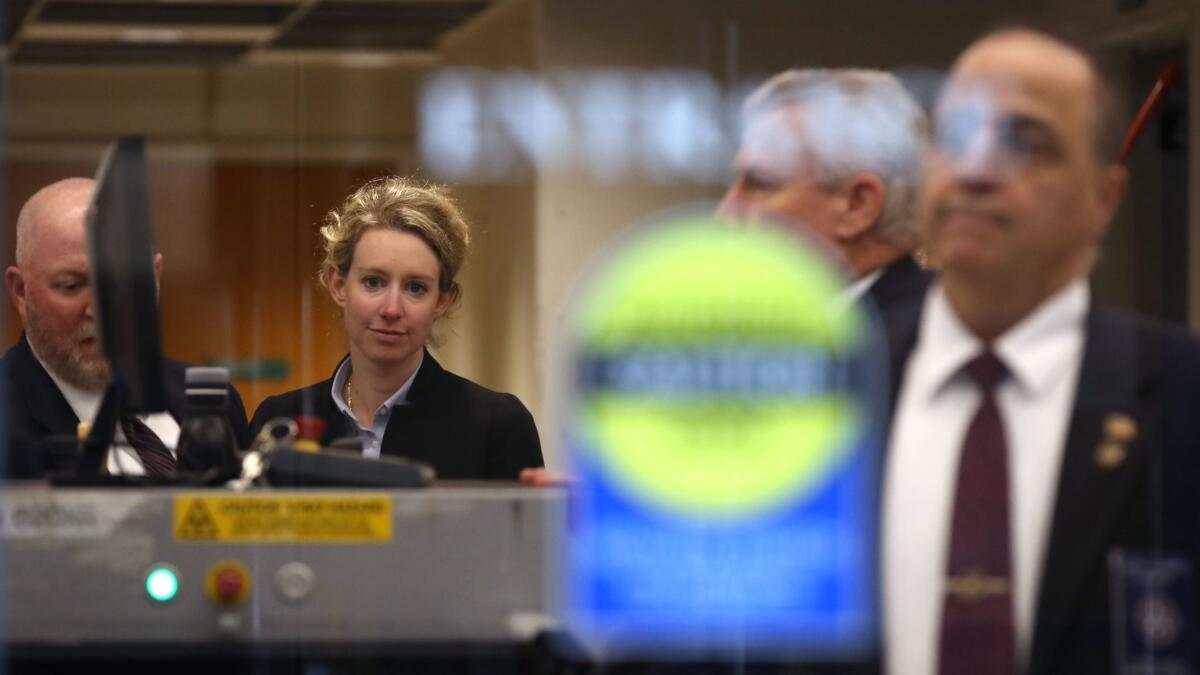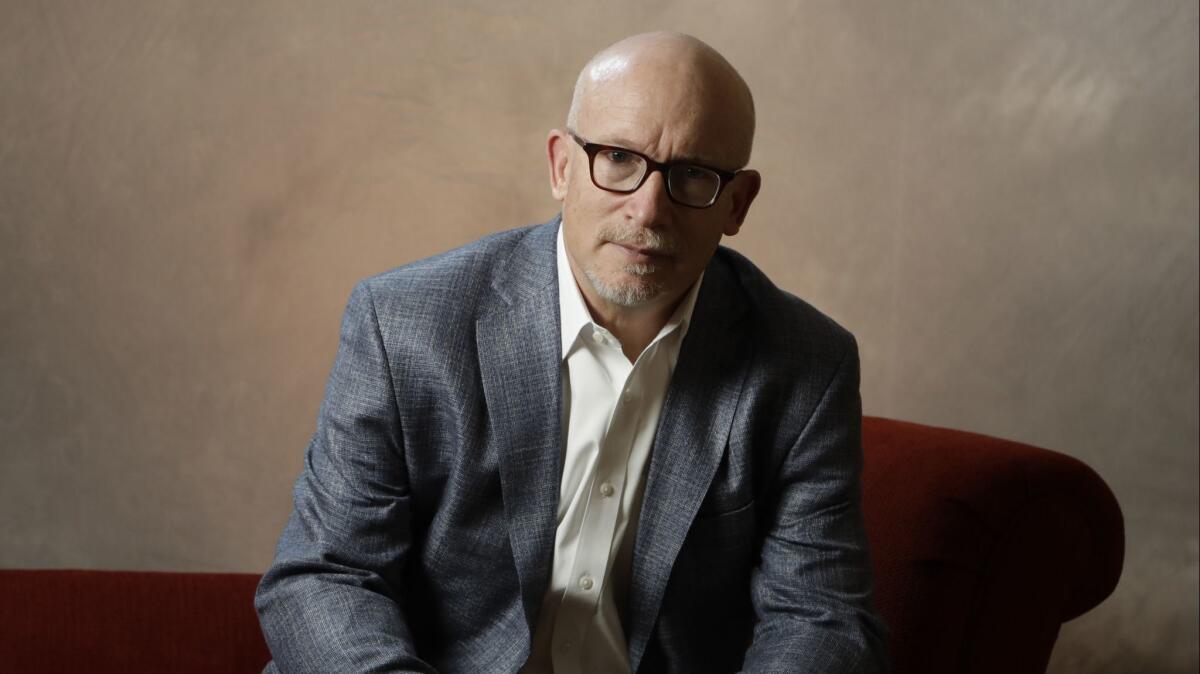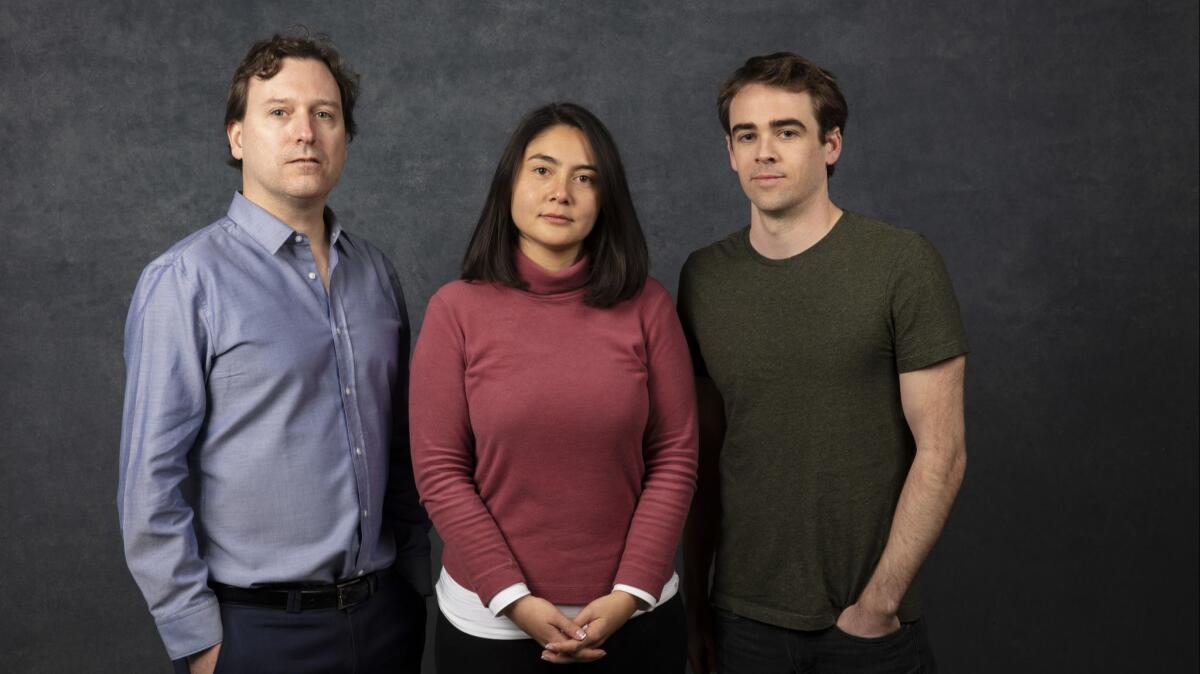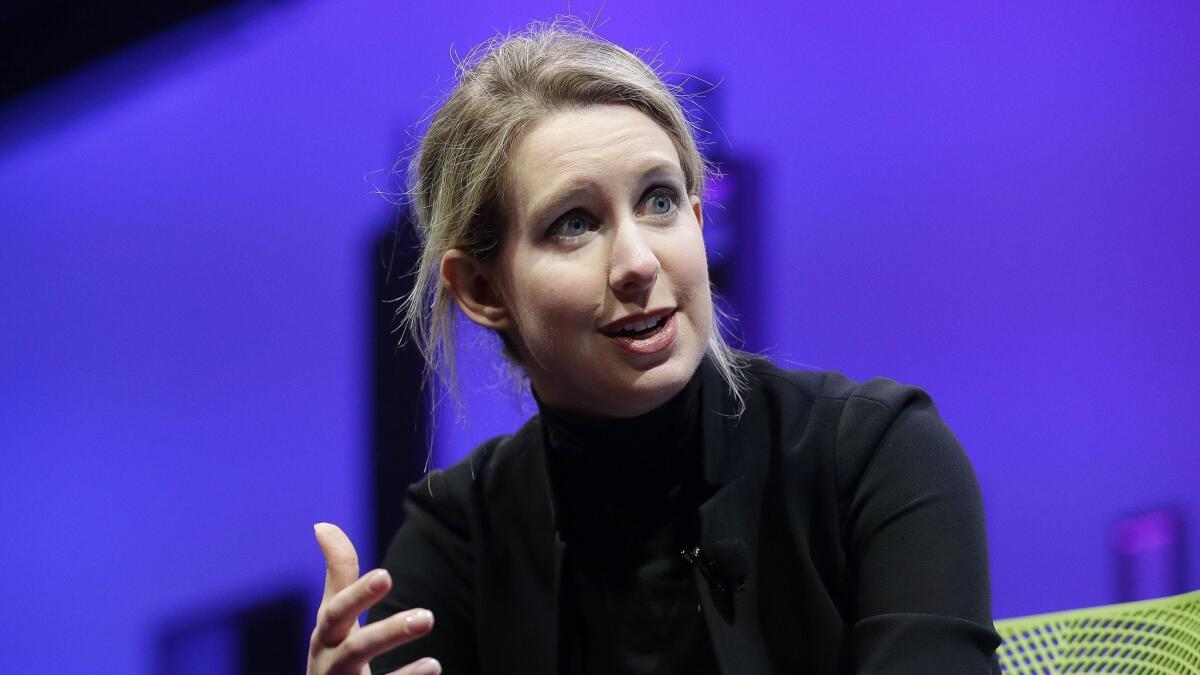A bestselling book, hit podcast and now a new documentary: Why is everyone so obsessed with Elizabeth Holmes?
- Share via
Even before John Carreyrou was done writing “Bad Blood,” he knew there were others clamoring to take a bite of the Theranos apple.
In 2015, the Wall Street Journal reporter broke the news of the fraud being committed at the Silicon Valley start-up, a biotechnology company that promised to revolutionize the blood-testing industry by conducting hundreds of health tests with just a single drop of blood. Theranos’ founder, a Stanford dropout named Elizabeth Holmes, was hailed by the media as the next Steve Jobs, in the process bamboozling the likes of Bill Clinton, George Shultz, Henry Kissinger and Betsy DeVos into singing her praises.
Based on the strength of his Journal articles about the scandal, Carreyrou sold a book proposal about Theranos — “Bad Blood” — to Knopf in March 2016. Within weeks, word of the sale spread in Hollywood, and filmmakers began reaching out to the writer’s agent at WME about adapting his manuscript into a feature film.
By June, Carreyrou’s team had struck a deal with “Vice” director Adam McKay, who quickly lined up Jennifer Lawrence to star as Holmes and secured a production pact with Legendary Entertainment and Universal Pictures. Screenwriter Vanessa Taylor is set to deliver a draft of the project within months, Carreyrou said.
Then, a little over a year later, when Carreyrou was in the final stages of writing “Bad Blood,” he was approached by filmmaker Alex Gibney about cooperating on an HBO documentary about Theranos. Given Gibney’s pedigree — he was nominated for an Oscar for his 2005 expose “Enron: The Smartest Guys in the Room” and won one three years later for his military torture doc “Taxi to the Dark Side” — Knopf felt a collaboration could “be a boon for book sales,” Carreyrou said.
Not that “Bad Blood” needs much help. With Gibney’s film, “The Inventor: Out for Blood in Silicon Valley,” set to air on HBO this Monday, Carreyrou said his book has sold over half a million copies across all platforms. The book has been out since May 2018, but the author said he saw a spike in sales in December, when Bill Gates recommended it as one of his five favorite reads of the year. Recently New York Times columnist Frank Bruni said it was “maybe the best book I read last year.”
Holmes has already been charged with “massive fraud” by the SEC and last year was ordered to pay a fine of $500,000, relinquish control of Theranos and vow not to control a public company for 10 years. She and former company president Ramesh “Sunny” Balwani have since been federally indicted on wire fraud and conspiracy charges and are awaiting the criminal trial.
As Holmes faces time behind bars, the interest in her story has only ramped up — as has the competition to find a fresh take on the story. In January, ABC News released a podcast about her, “The Dropout,” which rose to the top of the iTunes charts. (A two-hour documentary version of the series aired on “20/20” on Friday.) According to two sources close to the situation, ABC is shopping a television series based on the podcast; the network declined to comment on a potential sale.

So why is everyone so obsessed with Theranos?
“I think a lot of it, for me, is about deception,” said Gibney, who had come to Pasadena last month to talk to the Television Critics Assn. about his film. “I think that Silicon Valley sometimes likes to bill itself as the place where technology doesn’t lie. But it does. The ethos there is sort of libertarian: ‘We’re doing the real [stuff], and the real [stuff] is disruptive and it’s good and it’s going to make money and just back off.’”
The filmmaker said he was also interested in exploring the psychology of belief and deception. How was Holmes so convincing? How did she get so many powerful people to get behind an empty promise? And why were so many eager to believe in her? (Holmes, whose attorney Kevin Downey did not respond to The Times’ request for comment, has yet to contribute to any book, film, television project or podcast about her.)
“I think one of the reasons Elizabeth was so convincing was because when she’s making her pitch, she’s not Bernie Madoff thinking, ‘I’m feeding a bunch of [bull],’ ” Gibney continued. “She’s saying, ‘I believe this. I have the mission. I’ve been to the mountaintop.’ I believe in the moment — I never met her — but in the moment she was making the pitch, she believed it. I’m certain she was also was being given the information that the machinery was not working. But she was also thinking that because it was for a good cause, it’s OK. You fudge the truth because you have a noble mission.”
Gibney’s film tracks the rise and fall of Theranos, detailing how the Edison — the company’s big invention, which vowed to run 200 tests without requiring patients to do venous blood draws — was a sham. He interviews whistle-blowers who helped Carreyrou with his stories, former employees Erika Cheung and Tyler Shultz, the grandson of Theranos board member and former Secretary of State Shultz. The director was eager to sit down with Holmes herself, and his producer even had a five-hour off-the-record conversation with her in San Francisco.
“But she was at a point where she felt like she was very much the victim and people were coming after her because she was a woman,” Gibney said. “She said she was about to get a new round of financing, and everything was going to be great, and maybe we would like to come back and film her when she was back on top.”

Rebecca Jarvis, the journalist behind “The Dropout” podcast, also tried to secure an interview with Holmes.
“My biggest priority from day one was getting her on the record, answering tough questions about her company and explaining her technology and what it could actually do,” Jarvis wrote in an email, noting she became curious about Holmes over four years ago while working on a piece about exploding healthcare costs for “World News Tonight.” Holmes also declined to speak with Jarvis, but the journalist obtained deposition tapes of Holmes under oath for three days, which allowed for her voice — which many Theranos insiders have said she purposely dropped several octaves to sound less traditionally female — to be a part of the podcast.
“She became the world’s youngest female self-made billionaire before it all came crashing down. It’s mind-blowing in many ways and says a lot about ambition and drive,” Jarvis continued. “In order to have an Elizabeth Holmes, you also have to have many other people and institutions fail. It raises questions about Silicon Valley, about the media and about our willingness to buy a well-crafted narrative without a lot of substance. Elizabeth convinced so many supposedly smart people to buy into her narrative and put their reputations on that line for her, which makes the audience ask questions about themselves. I think that is why people keep coming back to it.”
While Carreyrou is interviewed in “The Dropout,” he declined to comment when asked his thoughts on the podcast. Gibney, too, demurred when asked about the audio series: “Bummer about that,” he started, before stopping himself. “It’s OK, that’s fine. It’s all good. Sometimes they, uh — let’s not go there.”
Carreyrou and Gibney, anyway, are on good terms. The journalist appears frequently in “The Inventor” and said he thought the documentary would help to bring a new dimension to his book by allowing people to see and hear from the characters he’d written about.
“Honestly, I’ve now seen it three times, and I think it’s very complementary to the book,” the author said, noting that he helped convince key subjects like Cheung and Tyler Shultz to talk to Gibney.

“I think that was some hesitancy in terms of working with other people because we had instilled so much faith with John,” acknowledged Cheung. “The company had not gone under yet, so there was still some uncertainty there. And also the retaliation — if [Theranos] still existed, could they just decide that their final hurrah is going and suing all those people?”
“Yeah, I felt at that point like I had a story to tell, but I had told that story, so I didn’t really see what the point was,” added Shultz. “I didn’t know Alex at the time, and I didn’t really know what I was getting into. I was leaning towards not doing it, and then I’m pretty sure Erika decided to do it and then John talked to me and they offered to fly me out to New York and give me ‘Hamilton’ tickets and I was like, ‘All right, easily bought.’ ”
As the quirks of Holmes’ personality have come to light over the past year — her uniquely deep voice, her penchant for Jobs-esque black turtlenecks, her ability to not blink — Shultz said he’s heard from many critics who question what exactly her allure was.
“When you see her, she looks like a crazy psychopath, so people ask: Why were you drawn into her?” said Shultz, who has since started his own medical diagnostics company, Flux Biosciences. “I would say that we also watched the Harvey Weinstein documentary, and you hear people talk about how charismatic and charming he was, but you watch that documentary and think, how could you ever think this guy was charismatic or charming? It’s kind of the same thing.
“Once you know the truth, it’s really easy to see it, but when you don’t — Elizabeth had this way of locking you in, and when she was talking to you, she made you feel like you were the most important person in her world right now and you were so important to achieving this vision that you were dedicated to.”
“And not only that, but she had credibility and a huge valuation,” said Cheung, who now lives in Hong Kong and runs an early-stage technology accelerator. “But I think we’re on the right side of history. We’ve gotten lucky in a certain way. You look at a lot of these huge fraud stories — Harvey Weinstein is a good example — and there’s been many instances where whistle-blowers do not fare well. So it was a big relief once the company went under that we did come out of this OK and it didn’t damage our careers.
“It wasn’t that we were trying to be alarmist or sabotage her or that, as she thought, we were trying to come after her and had some vendetta against her. I think we were all motivated by the fact that you can’t endanger the life of patients. This is healthcare.”

‘The Inventor: Out for Blood in Silicon Valley’
Where: HBO
When: 9 p.m. Monday
Follow me on Twitter @AmyKinLA
More to Read
Only good movies
Get the Indie Focus newsletter, Mark Olsen's weekly guide to the world of cinema.
You may occasionally receive promotional content from the Los Angeles Times.











